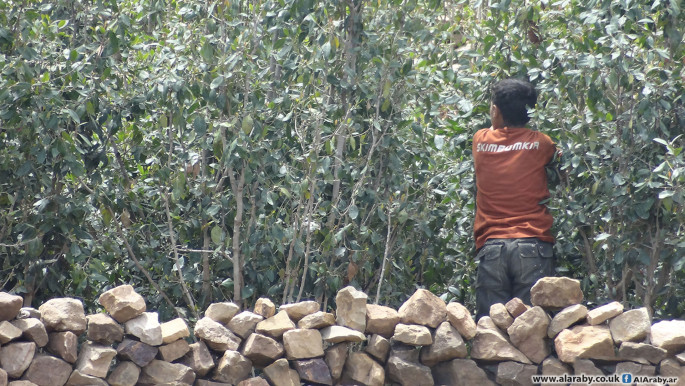Yemeni farmers replace qat trees with coffee
Qat is a popular plant in Yemen; its leaves and roots provide a mild stimulant effect when chewed.
Sheikh Abdullah Abbas al-Musababi, one of the region's leaders, said the uprooting of the tree came in response to the call of the Buhara Sultan, Muhammad Burhanuddin, a religious leader of the Ismaili sect.
The sultan has repeatedly called for the elimination for qat trees, and for them to be replaced with coffee, which can be exported abroad.
Eastern Haraz is known for its fertile land and the quality of its coffee. Around 75 percent of the land is suitable for the cultivation of the bean.
"We have uprooted the qat tree and today we plant coffee in many areas east of Haraz," al-Musababi said, adding that 13,000 qat trees had been uprooted in Jarma village and all qat trees in the in village of Saut.
A charity supported by the sultan provides modest assistance to farmers who uproot qat trees in order to plant replacement crops, and thus provide financial returns.
Twitter Post
|
"Some traders from the East Haraz region are interested in buying coffee from farmers and selling it through international companies," he said.
Another advantage of uprooting the qat tree is to reduce the consumption of water in the city.
"Our region suffers from a scarcity of groundwater," al-Musabibi said. "The cultivation of qat requires a lot of water, whereas the coffee tree needs a quarter of what qat needs."
He concluded by calling on Yemenis to uproot the qat tree wherever it was found, and focus on the cultivation of coffee, which "benefits the family, society and the nation".
His calls are widely supported by citizens. Mohammed al-Ayani confirms that qat has caused social and economic problems, as well as increasing water use. He said the cultivation of qat had expanded at the expense of other crops.
"Many citizens in Haraz uprooted qat trees and replaced them with coffee, almonds, vegetables and other crops with good economic benefits for citizens," he said.
 |
|
| A volunteer works to replace qat trees with coffee plants [Alaraby] |
Abd al-Rahmen al-Thalayya is one of the many who chew qat leaves on a daily basis.
But he too supports the move.
"This is a blessed community initiative to get rid of the scourge that has caused social problems in Yemen," he said.
He added that people who chew qat do so because "the most abundant agricultural product is affordable, and the state has not provided people with alternative things to do such as parks and sports clubs… most of those who chew qat want to eliminate it in Yemen", he said.
Jamil al-Harazi, a native of the region, emphasises the need to raise awareness about the dangers of qat trees to drive citizens to uproot them, or at least limit their cultivation in new lands, saying that villagers who have replaced qat are now receiving a good income from coffee - which he says is one of "the best varieties in Yemen".
According to local studies, Yemenis spend two billion dollars on qat annually. The majority of Yemeni male adults chew qat for up to four hours a day, while the number of women who chew qat is relatively low.
The qat tree is grown largely in Yemen, especially in the northern mountainous regions and central areas, and generates an income for millions of Yemenis who grow or trade the plant.
Follow us on Twitter: @The_NewArab





 Follow the Middle East's top stories in English at The New Arab on Google News
Follow the Middle East's top stories in English at The New Arab on Google News


